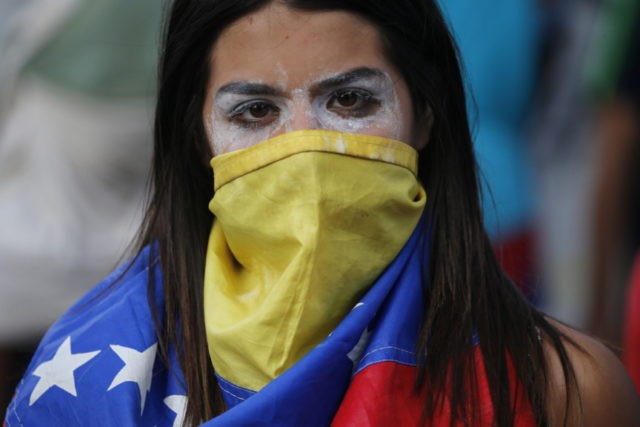The socialist dictatorship in Venezuela has killed at least 14 people and potentially closer to 20 since widespread protests broke out this week, culminating in the swearing in of President Juan Guaidó, replacing dictator Nicolás Maduro.
An NGO that tracks human rights violations in the country also confirmed over 200 arrests since Wednesday’s protests began, some the product of Maduro sending Bolivarian National Guard troops door-to-door to find individuals suspected of having participated in the protests and detaining them without warrants.
Citing the NGO Provea, the regional news agency NTN24 reported Thursday that Maduro’s forces had killed a confirmed 14 people nationwide in the past three days. While the leaders of the Venezuelan opposition organized their official protest for Wednesday, many dissidents organized smaller anti-Maduro protests to galvanize opponents of the regime throughout the week. Most of the deaths recorded were at gunpoint at the hands of law enforcement or the military.
The victims known to Provea were between the ages of 19 and 47, though most were in their 20s; only one was a woman.
Other groups have tallied known deaths and gotten different numbers. Opposition leader María Corina Machado said late Wednesday she had received confirmation of 17 deaths, “dozens injured and over 70 imprisoned.” The Interamerican Commission on Human Rights, which operates under the Organization of American States (OAS), tallied at least 16 deaths by Thursday morning.
The number of arrests also varies. The Venezuelan Penal Forum, an NGO that tracks politically-motivated arrests in the country, said Thursday it could confirm the detention of 278 people since Monday. The group found that 175 of these arrests occurred on Wednesday, while the rest occurred in anticipation of the protests, adding the caveat that they had many more reports of arrests and killings but these were the only ones they could solidly confirm occurred.
Venezuelans with access to social media used their platforms to spread videos and images of attacks on unarmed dissidents. One video, verified by the Venezuelan newspaper El Nacional, showed the body of a young man shot to death in Barinas state (warning: graphic images)
Anti-socialist former governor of Amazonas state, prominent indigenous political leader Liborio Guarulla, also posted images of dissidents bleeding from shooting wounds, stating on Twitter that the national guard had particularly targeted indigenous opposition members in the inland state.
NTN24 also posted an interview on social media with a young protester bleeding from the head.
“The guy grabbed me, said ‘move out the way, cocksucker,’ he tossed a bomb in my face, that’s why it’s broken,” the man in the video says, identifying himself as a fourth-year university student. “I want my country to be free, thats why I’m in the street.”
Several reports indicated that, when not targeting and killing protesters, repressive forces attempted to injure as many as possible in crowds. Those attempting to use the Caracas subway to reach protest locations stated that the National Guard hurled tear gas canisters into the subway, taking advantage of the limited space to cause more damage. Some military brigades went door-to-door looking for people they had a reason to believe were participating in the protests and dragging them out of their homes in Caracas.
Political opposition leaders organized nationwide protests for Wednesday, the anniversary of the establishment of a democratic Venezuela in 1958. Thousands attended and, in Caracas, they witnessed the swearing in of Juan Guaidó, then president of the National Assembly, as president of the republic. Venezuela’s constitution allows for such a move when a dictator “usurps” power or violates human rights.
Guaidó declared himself president and received the backing of most of the Western Hemisphere, including the United States, Canada, Brazil, and Argentina, among other nations. Yet he does not appear to have control of the military or law enforcement, which continues to brutally repress dissident speech.
In a message on Twitter late Wednesday, Guaidó lamented the attacks on protesters.
“I have no words to express the pain that I feel as I keep hearing that Venezuelans are being murdered during protests in recent hours. To their families, all I can guarantee to them is that Justice and Peace will reign in our nation,” he wrote.
Guaidó did take control of the nation’s diplomatic powers, however, inviting the United States to remain in the country after Maduro attempted to expel all American diplomatic personnel from the country.

COMMENTS
Please let us know if you're having issues with commenting.